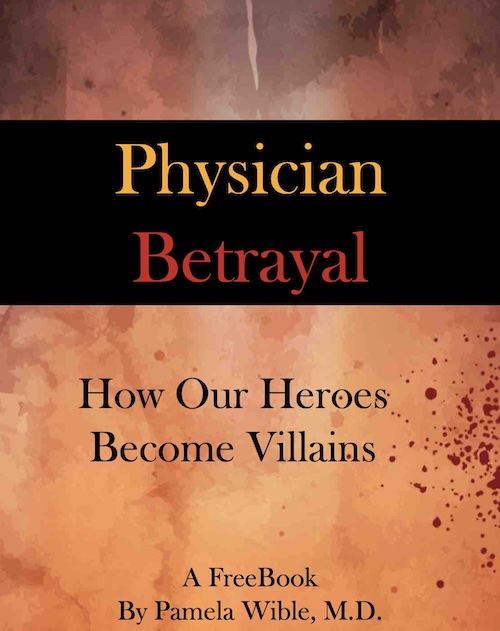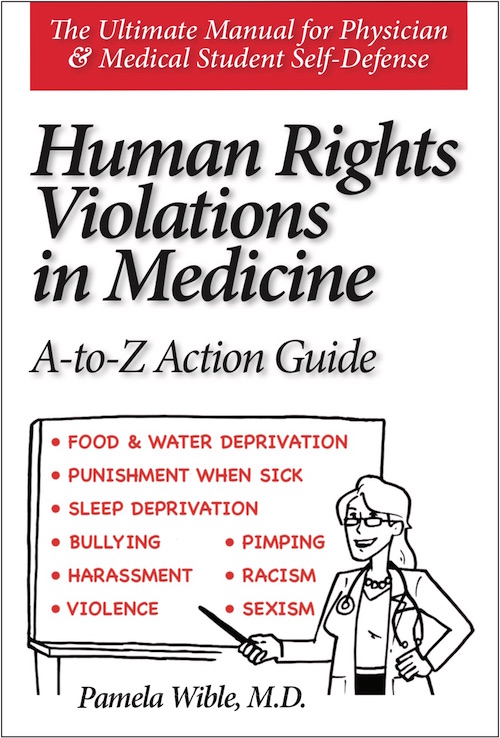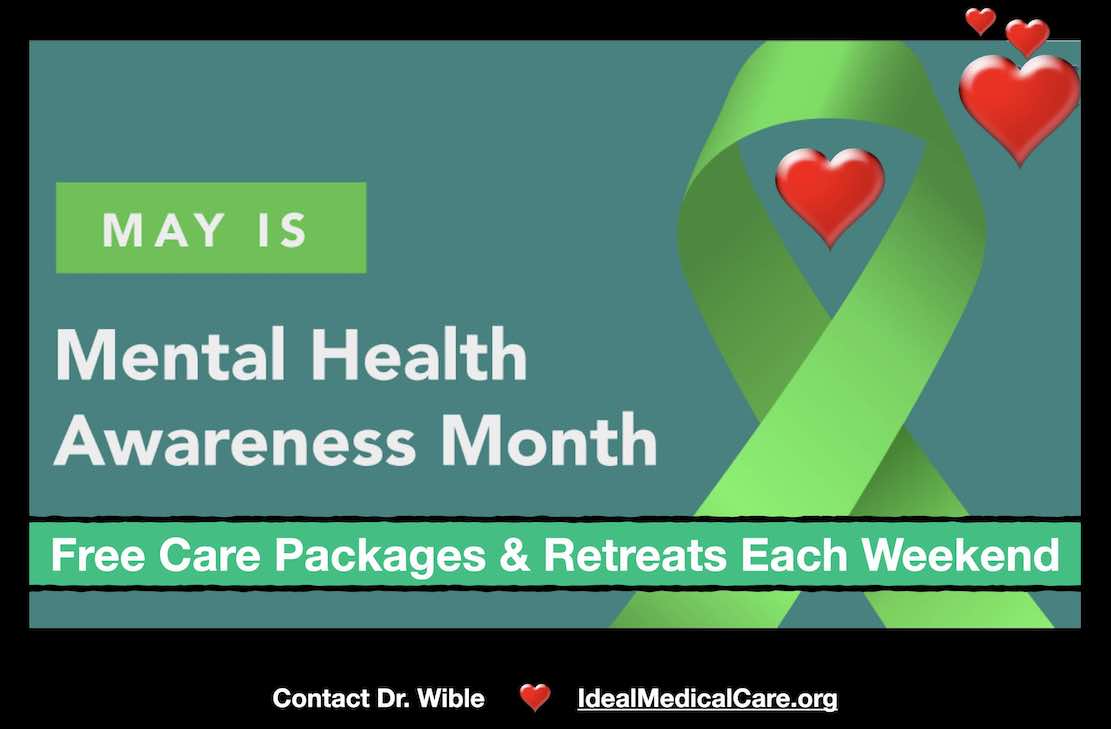Three doctors just died at one NY hospital—from one internal medicine residency. Kind, caring, bright doctors. From abroad, they came to serve Americans on the frontlines, yet were never honored for their service, like Dr. Lorna Breen who died by suicide—hailed a hero by the media. No media celebrated them as heroes. No media reported their deaths. They worked 120-hr weeks for less than min. wage, ran ICUs, saved New Yorkers’ lives. Yet who helped them? Struggling, their only way out was suicide and an accidental drowning. Please—don’t let their lives be forgotten.
***
Physician Betrayal: How Our Heroes Become Villains – FREE Ebook →
Click here to download now. Share widely.
We are living in an era of institutional betrayal. Trusted medical institutions tasked with training our healers have failed to protect their own students, staff—and patients. When our clinics and hospitals so deeply contradict what is expected, health professionals block their trauma to maintain attachment with their profession—betrayal blindness—a state of denial in which we don’t allow ourselves to see what is happening because the information would threaten our professional standing and world view. Physicians blind themselves to betrayal to survive in a career they believe they can’t escape. Betrayal among medical professionals can be fueled by jealousy, power-seeking, and fear that may push student doctors, resident physicians, attendings, even close friends and family to act against each other for personal gain. Despite well-meaning professors and new crops of idealistic med students year after year, medicine’s culture of betrayal is self-perpetuating and intergenerational. Here’s how patients and health professionals can break the cycle and heal from the trauma.
***
Resident Retaliation—Your Legal Rights →
This past week several residents have contacted me in the aftermath of a recent suicide of their co-resident to express fears of retaliation for standing up for their rights and the rights of the deceased resident who killed himself as a direct result of how his residency and hospital mistreated him. Moments ago I got a text from a medical student who is being harassed by his school for standing up for his human rights and the rights of a peer who died at the school. Retaliatory tactics are sadly commonplace in medicine for anyone who speaks up about hazardous working conditions. Please review chapter below from Human Rights Violations in Medicine for your medicolegal rights and how to proceed.
Resident Retaliation: An adverse action taken against a resident physician who exercises a protected legal right.
Retaliation is illegal when the action preceding the retaliation is protected by law. Physician trainees often experience retaliation when complaining about harassment and discrimination.
“When I spoke up about an attending groping me at the scrub sink, the physician in charge of my residency program told me, ‘He brings money into this hospital and you don’t. Either shut up or get out of the program.’ After that, I was seen as the problem.”
One obstetrician known for his threats and abuse of residents would end checkout with, “Your daddy’s lawyer can’t save you from me!”
“I was a new physician in my dream job, five months pregnant, when my 15-month-old had a febrile seizure in the middle of the night. I called out. I was nervous. I returned to my shift once my husband came home. The next day a nasty email arrived in my inbox accusing me of lacking accountability, integrity, and ‘burnout.’ ‘My baby had a seizure,’ I said to myself in disbelief. I took my concerns to the director of this major health corporation only to be written up for ‘lack of integrity and ‘burnout.’ The mistreatment did not stop. I was left in two 12-hour shifts in a row, not allowed to leave at six months pregnant. As a gestational diabetic with a high-volume patient load and no proper staffing, I would lie on the bathroom floor in between patients because I was in and out of consciousness as I could not eat properly for fear I would be written up if a patient complained they were not seen fast enough. When my supervisor would ‘drop by,’ he commented, ‘We need to hire more men; they don’t get pregnant.’ Women at this company keep coming forward with similar tales so I sought help from federal agencies tasked with protecting us from discrimination and workplace bullying only to be told if I had not been sexually assaulted and/or fired wrongfully, I had limited rights.”
“I failed my first emergency medicine rotation in third year because I had a miscarriage. I had to take two weeks off and the attending agreed to pass me for a two-week rotation, but then didn’t. All I ever wanted to be was an emergency doc. The subsequent glowing recommendations I received from other emergency rotations didn’t help. All residencies saw was that failure. And my school let it stand. Apparently, you’re supposed to still be on rotation and seeing patients with your baby falling out of your uterus.”
Retaliation even impacts the lives of physicians protecting their peers.
“Where I went to residency, the male faculty (married) were having sex with female residents in the call rooms. One female resident attempted suicide due to the pressure. I blew the whistle to the dean over our program. I was thrown out of residency. Years later, they still give me a hard time, and have allowed tampered education records to remain in my file because it was ‘my fault’ for blowing the whistle.”
TAKE ACTION NOW
-
Reference Discrimination and Harassment chapters for specific action steps in your situation.
-
Educate and protect other medical professionals who are experiencing retaliation when speaking up about human rights violations in medicine.
-
Avoid submitting complaints internally without legal counsel. Remember Human Resources protects your employer, not you. Your case is solid if you have documentation and an attorney representing you.
-
Reference Human Rights Violations Documentation Guidelines (read them here).
Retaliation article published from Human Rights Violation in Medicine: A-to-Z Action Guide—The Ultimate Manual for Medical Student & Physician Self-Defense. Read the first portion of book free by clicking on book cover on Amazon here or below:
***
Mental health care packages & retreats →
Med students, doctors—all healers: If you can personally share treats with 5 co-residents/peers, you get one of the last 100 gift boxes going out this weekend . . .
Mark Your Calendar—Each Weekend in May
May 1 ~ Kick off Mental Health Awareness Month with award-winning Do No Harm film (view trailer) exposing our doctor suicide crisis. * View film with BONUS features here.
May 2 ~ Free panel discussion on Sunday with Emmy-winning filmmaker, Robyn Symon, Dr. Wible, John & Michele Dietl who lost their son to suicide in med school. (5 pm PDT/8 pm EST) **no requirement to view film to attend free discussion**
May 8, 15, 22, 29 ~ TWO RETREATS each Saturday in May * 100% confidential * curated group (max 8 per retreat).
For care packages & to attend retreats,
register here for May 2 kick-off panel discussion
(where I’ll be sharing links to retreats).
After joining May 2 kick-off, contact Dr. Wible w/ mailing address & your situation.
***
Did your wounded child choose your career? →
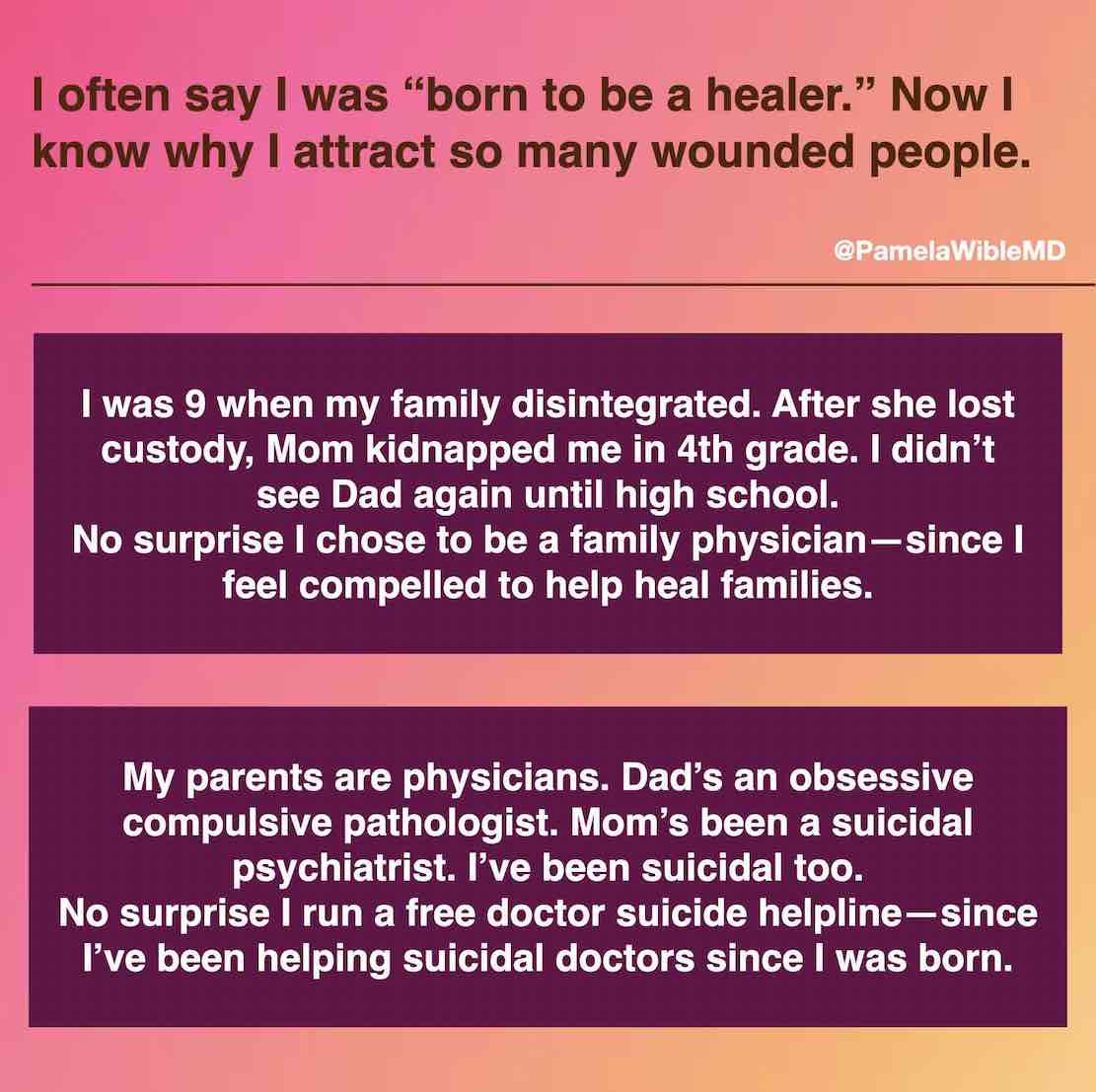
I often say I was “born to be a healer.” Now I know why I attract so many wounded people.
I was nine when my family disintegrated. After she lost custody in the divorce, Mom kidnapped me. “Get in the car,” she said as I walked home from school in fourth grade. I didn’t see Dad again until high school. No surprise I chose to be a family physician—since I feel compelled to be in charge of helping to heal families.
My parents are physicians. (So I had to master physician psychology to survive my childhood.) Dad’s an obsessive compulsive pathologist. Mom’s been a suicidal psychiatrist. I’ve been suicidal too. No surprise I run a free doctor suicide helpline—since I’ve been helping suicidal doctors since I was born.
Repetition compulsion is a psychological phenomenon in which a person habitually repeats an event or circumstance over and over again. Like ending up with an abusive boss in a toxic workplace again and again. Bullied as a kid in elementary school, then bullied in medical school, then bullied as a doctor by administrators. We set ourselves up unconsciously repeat our most painful experiences—until we consciously decide to stop the pattern.
Repetition compulsion is a defense mechanism—a psychological strategy that we unconsciously use to protect ourselves from anxiety arising from unacceptable thoughts or feelings.
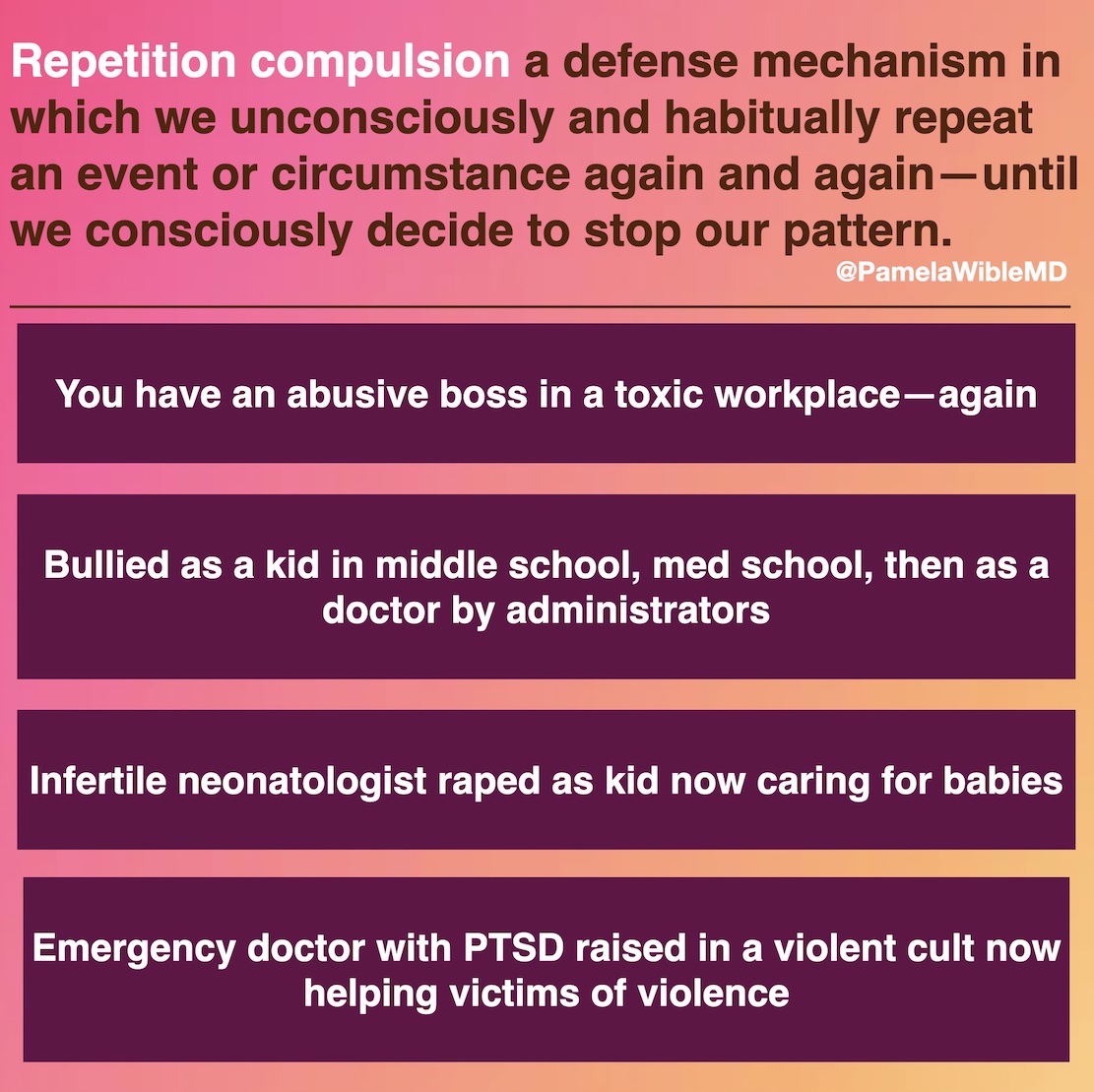
At a doctor “suicide retreat” I led last weekend, we confidentially shared our suicide attempts and depression with each other. Some of us realized for the first time that our childhood trauma dictated our career decisions. One physician shares (with permission): “I survived sexual abuse as a child, so to protect children I’m a pediatrician.” Others have shared: “I survived losing my brother to childhood leukemia so to help save kids from cancer, I’m a pediatric oncologist” and “I survived two suicide attempts as a teen, so to help teens I’m a child and adolescent psychiatrist.”
Helping others is noble and kind. Yet as a child I was ill-equipped to solve the emotional problems of my physician parents. So I’ve spent my life attempting to solve emotional problems of friends, lovers, and patients—often with great success. Now, of course, given my lifetime of expertise, I’m paid to do this professionally as a physician. Many physicians were caretakers as children who feel compelled to continue caretaking as adults.
Here’s the problem: Helping others without first understanding (and receiving help for) our own emotional wounds, we risk reliving our trauma. Like the emergency physician with PTSD who was raised in a violent cult now trying to help victims of violence. Like the infertile neonatologist raped as a child now caring for babies.
Workaholism is a physician coping strategy for trauma. If we distract ourselves with patients, we avoid our own pain. Eventually memories resurface, often triggered by our patients. Doctors then call me with panic attacks at work and insomnia and rumination at home—with no idea why they can’t function.
Last night an internist wrote me. Subject line: “Here we go again . . .”
“I’m not sure I can do this anymore. I’ve moved from multiple jobs and moved my family countless times. I’ve given my all to my patients and medicine. I was the second highest productive doctor out of ten and everything was going amazingly well. I was told that I was a great fit. After a year in my job I was completely blindsided with a contract non-renewal. I never had any problems with anyone; never killed anyone and always did what’s best for my patients. My family doesn’t want to move again. I’m completely dumbfounded and wondering what to do. I’ve seen counselors and psychiatrists and they have told me I’m fine but I’m completely at a loss. I’m ready to throw in the towel and not be a burden to my husband and kids. I’m grateful for what you’ve done. We’ve talked before. I have no words. All I wanted was to help people and can’t even help myself. I have no idea what’s left. I’m literally at the end of my rope.”
I get it. After six jobs in ten years, I was suicidal. I moved multiple times. I gave my all to my patients and medicine. I was the second highest productive doctor at one of those jobs. After a year in my last job I was completely blindsided with a contract non-renewal. Aha! My pattern: I realized I was a perpetual victim in a healthcare system that profits from dependency and victimology. As a disempowered doctor, I kept attracting disempowered patients who were overly dependent and sucked me dry. Over and over again. I hated my job. My patients hated their jobs. They kept begging me to complete disability paperwork. One wanted a workers comp claim filed for a paper cut that I couldn’t even find. Not kidding! I said: “Do you know how many people will get paper cuts dealing with the paperwork for your paper cut?” and I cut her off. When I launched my own ideal clinic, I stopped being a victim. Only then did I stop attracting patients who were victims.
So why do we compulsively repeat our most painful events? In our quest to gain a belated mastery over our own trauma, we yearn to relive it so we can finally create what we’ve always yearned for—a happy ending.
If you’re suffering, start journaling. Discover your own patterns. Need help? Reach out.
***


